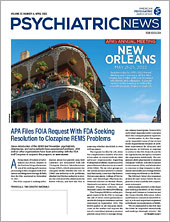In January, HR 3630, the No Surprises Act, went into effect. It contains its own potent surprise: that health care professionals, including solo psychiatrists, must deliver to patients a “good faith estimate” (GFE) of their full care and that health care professionals are liable for unpredicted costs. This currently applies to all new patients and to established patients with no insurance or with insurance they decline to use. In 2023, it will apply to all patients.
The billing conversation and treatment agreement are the standard of practice, which should be sufficient, but are not under the new law, and the documentation requirements are burdensome and compel uncompensated labor. But these pale in comparison with the real problem: GFEs create a black hole of liability in the form of, ironically, a surprise bill.
The GFE requires that we estimate the next 12 months of care costs, including (effective 2023) outside services such as laboratory studies, imaging, and psychological testing. Solo practitioners are required to somehow obtain these costs and keep them up to date on a live basis, a straightforward impossibility. If we are inaccurate by more than $400, the patient can pursue arbitration, which, if successful, transfers to us any expense above our estimate. A single unpredicted hospitalization could result in a surprise bill for the referring psychiatrist that would shutter most practices. While one could try to provide an updated GFE, it is not difficult to imagine an arbitrator determining that this undermines the GFE’s purpose.
The phrase “good faith estimate” is thus an oxymoron: It is no estimate, and it cannot be made in good faith. It is a binding contract based on the impossible expectation that we are able to read the future. And if we botch our crystal ball reading, a patient, or the patient’s insurer, can take us to the bank.
Many new patients vacillate, and the GFE, which we are plainly incentivized to overestimate, is gasoline for that fire. Some of them will cancel, and we will then see them in the emergency department instead of the office. Even if they engage, the GFE compromises it: Good psychiatric treatment involves a process of discovery that often leads to unexpected results. We learn early in training that assumptions are dangerous. Because the GFE requires us to make and rely on prejudgments, it may be impossible to practice good psychiatry and be in compliance with the law. Further, the GFE creates a perverse incentive for psychiatrists when patients get sicker because we must now consider whether we predicted the additional costs. If not, we have a Sophie’s choice: Don’t treat or do and risk our livelihoods.
The original purpose of the law was to prevent surprise billing, already a nonissue in outpatient psychiatry. Its actual functions are to make us pay for patients’ care and to rob us of autonomy. It forces us to price our services like a retail product, when we are more like sculptors: we know when to use our tools, and our hands remember the clay, but nobody can guess how the fire will change the glaze. It precludes individualized treatment.
Unsurprisingly, the law was heavily lobbied by the insurance industry, particularly Anthem Blue Cross/Blue Shield, which filed almost three times as many lobbying reports as the next-highest organization. Now we stand before them blindfolded, and the GFE is their machine gun: They will use it to justify coverage denials, suppress reimbursement rates, force patients to pursue arbitration at our expense, and coerce us to refer to their preferred providers, and then hold us liable for unanticipated costs (itself an anticipated outcome of seeing specialists). All of these possibilities leave our practices vulnerable to a fatal surprise bill. The GFE is a leap forward on the familiar journey toward annihilating physician autonomy and solo private practices. Patients and psychiatrists alike should be alarmed that the Centers for Medicare and Medicaid Services has made our work more burdensome and precarious during a period of unprecedented need for mental health care and burnout of health care professionals. The law was intended to prevent health care executives from looting patients in extremis, but its true consequence will be that they loot us instead. An exception must be made for outpatient psychiatry. ■
APA has signed onto a letter with other behavioral health associations about the administrative burden posed by the GFE and asked for an exemption from the regulatory requirements. At press time, APA was also seeking a meeting with CMS to update officials on APA member concerns and to work toward a solution, including simplification of the information required by the GFE. Look for more information in a future issue. APA’s guidance for psychiatrists on the No Surprises Act is posted
here.

